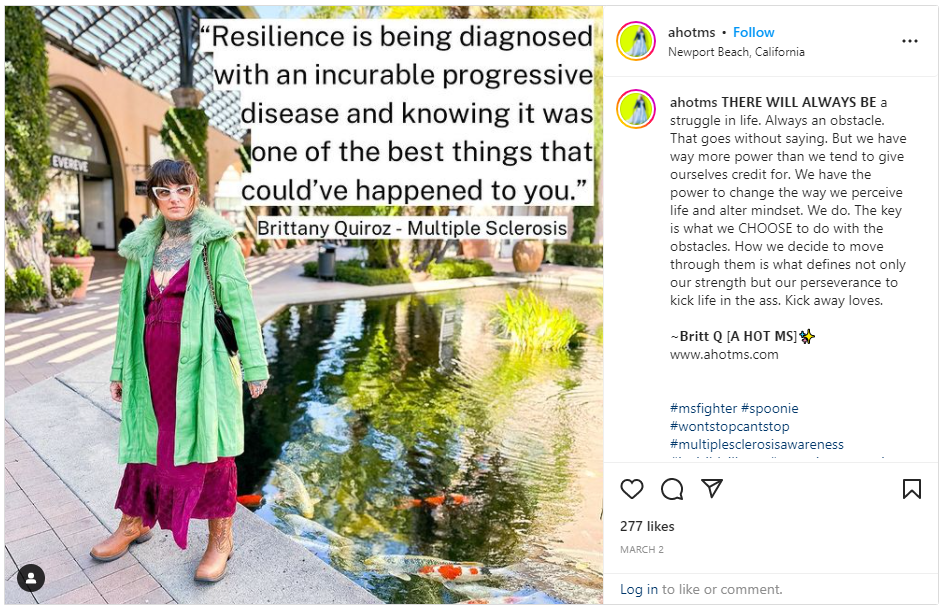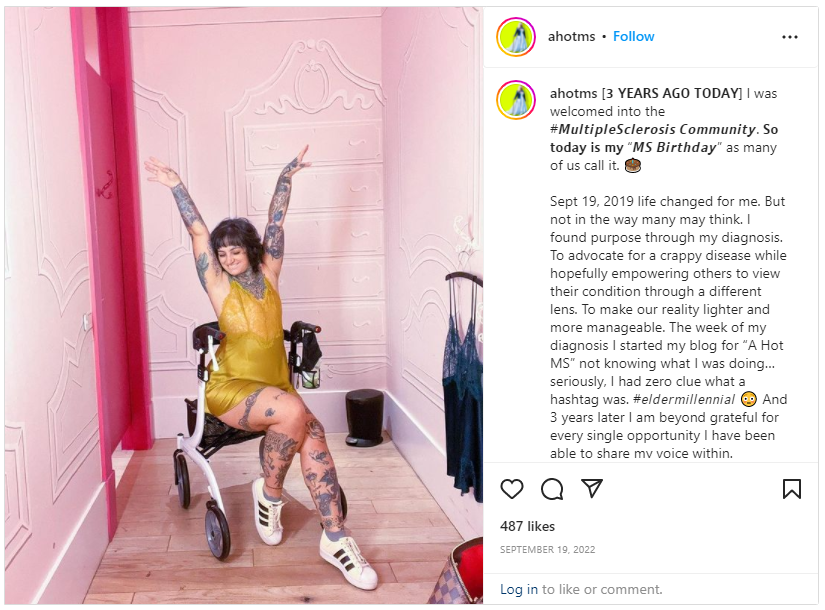“A Hot MS” Celebrates the Everyday Disasters That Shape Patients’ Lives
Performer and multiple sclerosis advocate Brittany Quiroz is keeping it real—and empowering others.

If all the world is a stage, as William Shakespeare’s Jacques asserted around 400 years ago, most of us are metaphorical bit players whose challenges and dreams don’t factor into the main story. That is not the case with Brittany Quiroz, an actual performer who has seized a lead role as an MS patient advocate.
For many of her childhood years, Brittany felt unsteady on her feet, on and off stages. She had occasional trouble with balance, so appeared clumsy at times. She studied dance and couldn’t help sometimes dragging her feet. More than once, she tripped and fell on the ballet floor. Her parents thought these physical issues were preteen affectations and urged her to elevate her steps.
Brittany continued to perform into adulthood. She danced, acted, and sang. She also continued to lose her balance and stumble, but by then that was just a part of who she was.
“Up until I was 30, I had nothing but hypoglycemia and cold-induced asthma. I come from a long line of autoimmune problems, but I thought that was all skipping me,” she said in late 2022.
Sharing with the MS Patient Community as a Coping Mechanism
In the late 2010s, Brittany was working in mortgage banking—singing, too, though dismayed by the state of the music industry—and experiencing something of an existential crisis. She wanted more from her life but wasn’t sure what that meant or how to achieve it.
A person of strong religious faith, Brittany asked God to help give her direction, to show her a way to use her creativity “to help people.”
Around that time, Brittany’s ongoing balance and leg-control issues finally become too pervasive to dismiss. She sought a medical explanation.
Following many appointments and diagnostic tests, on September 19, 2019, a neurologist diagnosed Brittany with secondary progressive multiple sclerosis (SPMS). The revelation overwhelmed her. But not for long.
“What if this is God’s way of saying, ‘This is what I’m giving you. Go make it work’”? she said of her diagnosis. “I’m thinking this is what’s supposed to happen. It’s alarming to be hit … with something designed to destroy you [and] feel calm and in control. It was a moment of reassurance. I have been asking for something more, and now I have this.”
Brittany scoured the internet for MS support groups, patient stories, anything that might help her become more informed or that aligned with her growing sense of purpose. She found a lot of negativity on social media and blog posts—and then discovered Ardra Shephard’s website Tripping on Air: My Trip Through Life with MS.
Brittany was galvanized. She started a cleverly titled blog, A Hot MS, and began to document her emotions and experiences related to her condition. She only had one rule: complete transparency. Following that rule was easy.
“I’ve always been an open book. I think it’s an artist thing, the thespian in me. I act on impulse, on emotion,” she said. “And it [was] a coping mechanism. If I could put it out there, I could own it. It was like an emotional enema.”
Brittany’s music and theater background did not make her a graphic design or social media expert. A self-described “elder millennial” and “goober,” she launched her online presence with little knowledge of branding and no real plan beyond sharing everything—good, bad, and quirky. She soon set up Facebook and Instagram accounts for the opportunity to share more photos that underscored her transparency.
“We have one life. It’s short. I could complain about MS or I could turn it into something beautiful,” Brittany said of her decision to take her experience public.
People living with MS from all over the world were quickly drawn to her unfiltered writing, untouched images and videos, and raw, intrinsic sense of humor. She’d created a beautiful budding community.

Relinquishing Control, Developing Resilience
Brittany’s two stepchildren were under 10 years old when she was diagnosed with MS. She and her husband debated how to tell their kids about her health condition, or if they should put off telling them at all. They read and heard opinions from multiple points of view.
Ultimately, Brittany and her husband sat down with their kids and explained Brittany’s circumstances. They compared her neurological system to a computer and the MS to a virus. With typical dry mirth, she recounted how this discussion ended: “My daughter asked, ‘Mama, are you dying?’ I said, ‘No, I’m not dying.’ ‘OK, can I have a Pop Tart?’”
In the years since Brittany shared her diagnosis with her children, she and her husband have emphasized inclusivity in their family interactions. They want their kids, now 11 and 12, to view people with illnesses and disabilities as no different than healthy people. They don’t want their kids to assume anything about others’ health based on appearances.
“We want to avoid this programmed ableism that’s part of our society,” Brittany said. “Invisible illnesses are really tricky with younger people. They say, ‘But you look so good!’”
Brittany hoped that if either of her children were one day diagnosed with such a condition, they would face it with strength similar to her own. She noted, however, that instant resiliency was unreasonable and anyone newly diagnosed with a significant disease such as MS should allow themselves time to adjust. She’d learned that personally.
“I’m the fixer, the empath who will put a cape on and fly around and save everybody. But then the cape gets stuck in a fan and pulls me in and it chokes me,” she joked. “MS is not a controllable disease. If you feel you need to do that, you’ll drive yourself nuts. Giving yourself grace is important. For the first few months, I didn’t do that.”
Brittany came to realize that her body not only wouldn’t always “cooperate,” but that trying to predict or control how it might function made her life more difficult. Instead, she shifted focus to her mind and how she processed what MS dealt her.
Embracing the fact that she might trip or fall or lose control of her bladder at any moment freed her to develop an inner strength that shined through in her online presence. It helped her become not just truly transparent with what she shared, but a proponent of transparency itself.
“We’ve all been trained to not brag about our failures. But you can’t have one without the other, so I share it all. You’re going to fail. You’re going to pee your pants. That’s a reality of having MS. The failures are going to change you and mold how you get through it all,” Brittany said. Then she added, “Resilience is a mindset.”
Owning the Patient Role
Brittany’s approach to interacting with her health care team also changed over time. When she was diagnosed with MS, she understandably “played the role of listener.” Digesting the news was difficult and she saw whichever health care professionals were in the room as the only people who could help.
Since then, Brittany has taken an active role in her relationships with doctors. “I’ve learned that you have to manage your health like a business,” she said. “If you have members of your business who are not on the same page, it’s OK to fire someone, to interview someone. When I have a new appointment with a doctor, it’s not all decided already. It’s an interview. I want to see their opinions on things, how they make me feel, if they make me feel confident in managing my disease.”
Brittany supplemented the information she received from her health care team with regular online research. The community she fostered on social media was a source of wisdom, too. She shared what she learned with her followers, and they routinely responded in kind. An insight garnered in a China or UK doctor’s office could trigger important questions for Brittany in California, and vice versa.
Questions were a key tool for Brittany to build confidence in her daily life with MS. She said that being given time by doctors to ask questions was a “right,” and that all patients should seize that right to be “part of the solution.”
Being proactive with her questions and interactions with doctors allowed Brittany to gain a sense of control through increased knowledge, if not control over her condition itself. As she acknowledged, “With MS, there’s not a set curriculum as to how it progresses. … You have to be ready for anything.”
Such as when Brittany’s original SPMS diagnosis was revised to relapsing remitting multiple sclerosis (RRMS), a potentially positive differentiation—and one that raised new concerns.
Such as when, in September 2022, Brittany tested positive for the John Cunningham (JC) virus. This meant she had to stop receiving TYSABRI, her MS treatment since summer 2021, but one that increased her risk of a serious brain infection that can be caused by the JC virus.
“I’m here because it’s my genetic makeup, it’s a molecular problem. Knowing how pharmaceuticals interplay with these things, and how to approach changes to treatment—it’s a hard position I’m in. … If I try one [treatment], it could cause this problem. Another, a different problem. But if I do nothing, it progresses faster. It’s a chess game,” Brittany said. She was scheduled to talk through potential next moves with her neurologist in a few days.
Rather than fret over her necessary change in treatment, though, Brittany was focused on a positive. September 19, 2022 marked her third “MS birthday.” She pointed out the nearing milestone with pride.

Favoring Action Over Influence
“Living with MS is hard…but it’s only as hard as you allow it to be. Celebrate your disasters…your victories get enough attention,” Brittany shared on Instagram on September 19. Within three days, the post had garnered nearly 450 likes and 50 comments.
These numbers are typical for Brittany’s social posts, which remain focused on the many facets of her MS experience. Between her Instagram, TikTok, and Facebook accounts, she is approaching 10,000 followers. Rarely does a day go by that she doesn’t share a photo or video.
Nothing is taboo on Brittany’s social feeds. Much of what she shares cuts straight through what might be considered “vulnerability” to simple unvarnished reality. What appears staged is done so for comedic effect. For people diagnosed with MS, it’s all relatable, even if her abundant tattoos and clear comfort with the spotlight may not be.
Brittany acknowledged that her initial goals for sharing her MS journey with others had evolved since 2019. “At the beginning, I was doing it for self-acceptance and connection with others. Then it slowly started to build into this brand. I think it now holds a lot of responsibility.”
Though Brittany didn’t take her platform or sense of accountability lightly, she was quick to disavow the “I” word. “I hate the word ‘influencer.’ It feels like something lighthearted, like someone showing you how to contour,” she said.
Brittany treasured the relationships she’d developed through her efforts, calling the digital associations a collective “team” and a “family.” Like a family member, she had their best interests in mind when mapping out her future advocacy efforts. She was planning a podcast centered on people overcoming significant odds. And she had aims on speaking to audiences and writing a book. She’d also hoped to partner with a health organization and develop a dynamic program for people newly diagnosed with MS.
“So often, you hear [patients are told], ‘Now go have an MRI and good luck.’ There’s so much more to it, but people can be just left with the shock factor of ‘What now?’” Brittany said. She wanted to help develop answers to that question.
Rocking Life with Multiple Conditions
Though Brittany’s attitude is glass-half-full positive, her glasses are not rose-colored. She has bad days. Her husband occasionally finds her in the shower in tears. She has battled depression, and intimately knowing its dangers, doesn’t allow herself to “go there.” And MS is just one of her multiple health concerns.
In 2020, Brittany underwent a bilateral mastectomy after testing positive for the CHEK2 gene mutation, which put her at 65% risk for developing breast cancer. Two more surgeries to address issues with implants followed. Then, in September 2022, an emergency appendectomy.
Brittany also lives with irritable bowel syndrome with constipation (IBS-C), fibromyalgia, asthma, dermatitis and psoriasis. In performance terms, hers is an ensemble cast of conditions that crowds the stage of her body.
“I could moan and complain. But if I play the victim card? That gets me nowhere. You have to pull yourself up and rock it,” Brittany said. “And why not? I deserve and choose to be happy.”
Clearly, this message is resonating with the MS patient community.
Photos courtesy of Brittany Quiroz.
